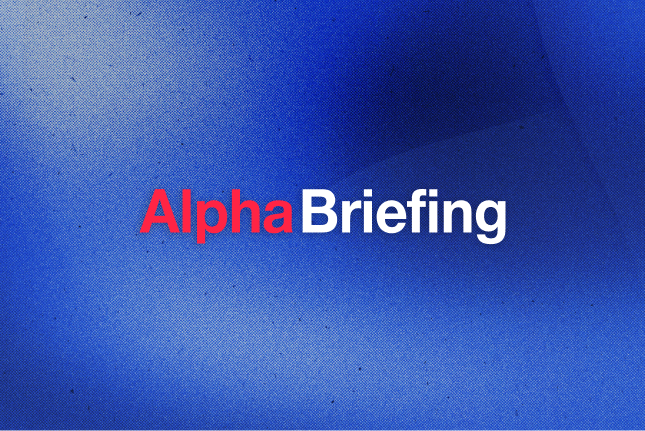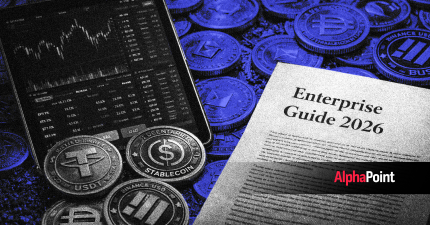AlphaBriefing – Institutional Insights

AI Agent Market Surges From $100M to $5B
The AI agent market has seen its capitalization surge from under $100 million to over $5 billion in less than three months. Tokens like AI16z and Virtuals have spearheaded this rise, offering infrastructure-focused utility rather than memecoin-style speculation. AI16z, built on its ELIZA framework, reached an all-time high of $2.01 with a $2.2 billion market cap, while Virtuals hit $5.20 and commands a $5.2 billion valuation. Virtuals Protocol’s platform has emerged as the dominant AI agent launchpad, simplifying tokenized AI agent development on Ethereum layer-2 Base. Over 50% of the sector’s value is concentrated in four tokens: GOAT, Virtuals, AI16z, and Zerebro, with Virtuals implementing a transactional demand model and AI16z focusing on developer engagement, evidenced by its status as the top-trending repository on GitHub.
The intersection of AI and crypto is fueling creativity in the spce, blending automated agents with blockchain functionality. Unlike past cycles dominated by DeFi and NFTs, this wave centers on AI-driven automation, task execution, and community-built innovation. Notable projects include Zerebro, which integrates NFTs, DeFi, and music production, and the GOAT token, which catalyzed the sector’s emergence with its rapid $1.3 billion valuation. Analysts predict that AI agents will increasingly disrupt financial APIs, with market participants like Virtuals and AI16z already enabling rapid adoption
Ethereum ETFs Experience Record Inflows in December
In December 2024, Ethereum (ETH) spot exchange-traded funds (ETFs) recorded their strongest month ever, with net inflows totaling approximately $2.1 billion—an 83% increase from November’s $1.2 billion. These inflows brought the cumulative total for ETH ETFs since their July launch to $2.6 billion and pushed total net assets to over $12 billion, representing about 3% of Ethereum’s market capitalization. Most inflows occurred in early December as ETH briefly surpassed $4,000 before retreating mid-month, with inflows rebounding to $349 million in the year’s final week. BlackRock’s ETHA fund dominated, amassing $1.4 billion (over half the monthly inflows), followed by Fidelity’s Ethereum Fund with $752 million.
Ethereum’s ecosystem expanded 48% in 2024, despite navigating network challenges, a solid performance but modest compared to Bitcoin’s 120% surge. The “Dencun upgrade” launched too late to fully capitalize on market trends, and staking, which locks up 28% of ETH supply at a 3% yield, has been criticized as less attractive compared to traditional finance returns. Additionally, Ethereum’s network usage remains below earlier peaks, with competition from networks like Solana pulling users away. Analysts predictions are supported by derivative indicators pointing toward a return to $3,900, with potential breakout targets at $4800, $7500, and 11k supported by Fibonacci sequence analysis.
Pro-crypto Environment Taking Shape in Washington
With Rep. French Hill (R-Ark.) leading the House Financial Services Committee, crypto legislation like FIT21 aims to grant the CFTC increased authority over crypto spot markets and digital commodities while establishing boundary conditions for the SEC. Clearer stablecoin legislation will likely resurface as well, in the face of MiCA taking hold in Europe, but more concurrent with the outcomes of Hong Kong’s proposed bill for HKMA-supervised stablecoin issuers. On the Senate side, crypto-friendly Sen. Bill Hagerty (R-Tenn.) and other lawmakers are expected to support efforts for a stable regulatory framework, though they will inevitably contend with traditional legislative priorities such as tax reform for bill attention.
The SEC, now under crypto-friendly appointee Paul Atkins, is expected to shift its approach to crypto regulation. Atkins, a crypto-friendly former SEC Commissioner and member of The Digital Chamber’s board of advisers, is anticipated to prioritize rulemaking that supports staking and other crypto products. Atkins will join Republican Commissioners Mark Uyeda and Hester Peirce, forming a Republican-led SEC expected to prioritize a less enforcement-heavy approach to crypto regulation. This includes potentially revisiting Regulation ATS, which could redefine decentralized projects as alternative trading systems. Additionally, Congress and the SEC are exploring initiatives like a strategic Bitcoin reserve, championed by Sen. Cynthia Lummis (R-Wyo.).
Solana and New Crypto ETFs Poised for Launch
The SEC’s recent approval of the first spot Bitcoin and Ethereum combination ETFs from Hashdex and Franklin Templeton signals broader ETF innovation in 2025. These ETFs, set to launch in January, will provide diversified exposure to Bitcoin and Ethereum, with allocations expected to mirror free-float market capitalizations, approximately 80% Bitcoin and 20% Ethereum. Meanwhile, new filings from Bitwise and Strive Financial focus on corporate Bitcoin treasuries. Bitwise’s “Bitcoin Standard Corporations ETF” will invest in companies holding over 1,000 BTC, weighted by their Bitcoin reserves rather than market capitalization. Strive Financial’s “Bitcoin Bond ETF” will target convertible securities from companies like MicroStrategy.
Solana ETFs are also poised to join the market, with equity exchange Cboe BZX piling proposals for spot Solana ETFs from issuers such as VanEck, 21Shares, Bitwise Asset Management, and Canary Capital. The SEC has until March 2025 to make a decision on these applications and others. Prediction markets, such as Polymarket, currently assign a 78% probability to the approval of Solana ETFs by the end of 2025. There is speculation about potential ETFs for XRP and Litecoin emerging with cryptofriendly appointments in key regulatory positions under president-elect Donald Trump.


